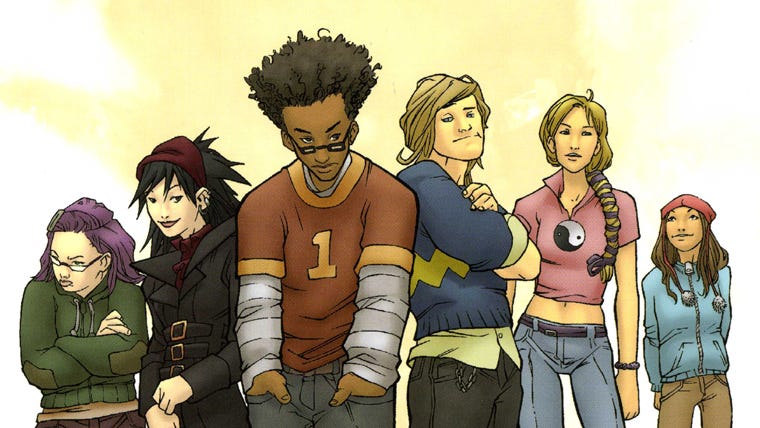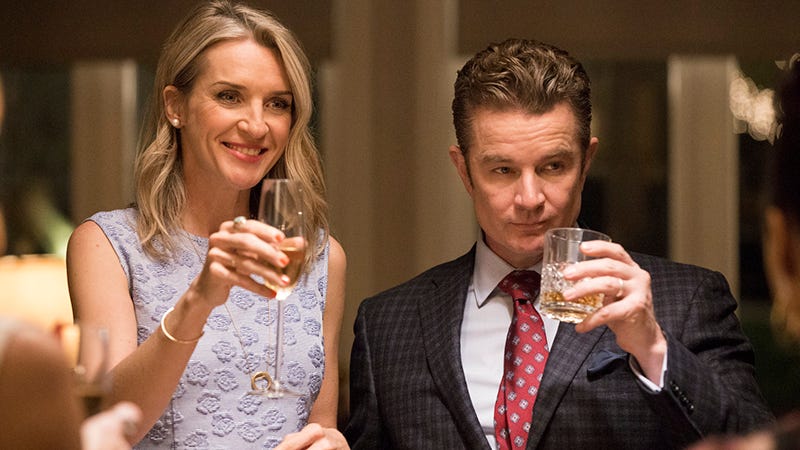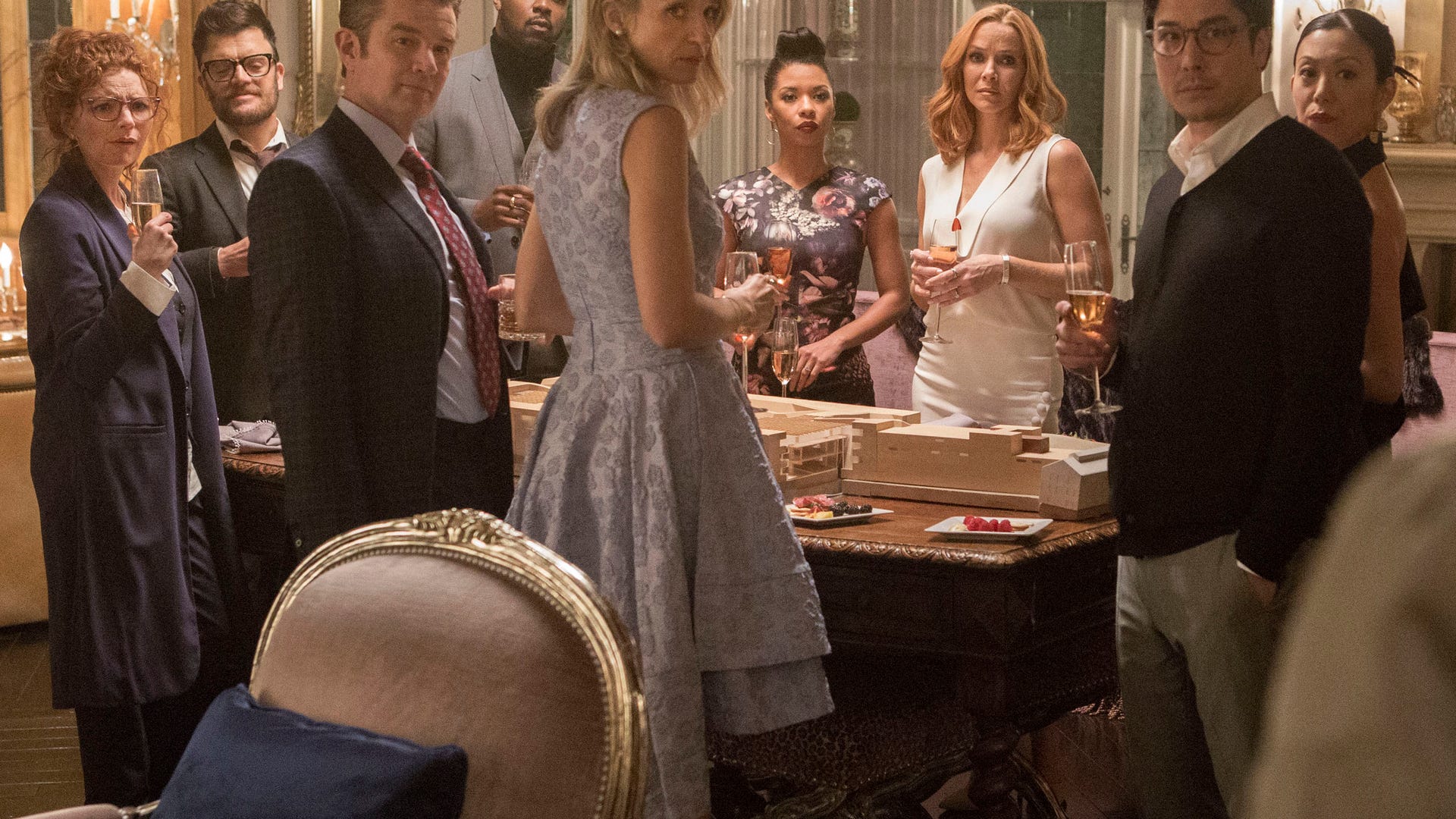Join or Sign In
Sign in to customize your TV listings
By joining TV Guide, you agree to our Terms of Use and acknowledge the data practices in our Privacy Policy.
How Fate Brought Marvel's Runaways Together
Marvel and Hulu's first teen team up always belonged in the hands of Josh Schwartz and Stephanie Savage.
Years ago, Jeph Loeb, Head of Television at Marvel, called a nascent project "The OC of Marvel", not knowing how prescient his words would be when later Josh Schwartz and Stephanie Savage signed on to helm Runaways. The longtime co-showrunners, famous for angsty teen dramas The OC and Gossip Girl, were a perfect, and perhaps predestined fit for writer Brian K. Vaughan's critical darling: A comic that takes the idea that every teenager thinks their parents are evil and then asks, well, what if your parents actually were?
The teens central to Runaways are faced with that very question after discovering their parents, all wealthy suburban couples with tasteful mansions in LA, owe their success to the occult human sacrifice they perform once a year. Runaways then earns its name (in the comics, at least) when our heroes run away. Determined to figure out what's going on, and how to stop their parents from killing more people, the reluctant team figures out how to survive in one of the most touching coming-of-age stories told in comics.
Nobody had to sell Josh Schwartz on the idea. He'd been a fan since long before Lis Rowinski, Head of TV Development at his and Stephanie's Fake Empire Productions, told him the project was being taken off of Marvel's movie slate and added to its character driven TV empire. But Savage had never heard of the book, something Schwartz was quick to correct.

"Runaways was one of Josh's, if not his all-time favorite comic book. I didn't know it at all. He had his fingers crossed that I'd like it as much as he did," Savage told TV Guide, after her writing partner made her sit down and read the whole series, cover to cover. Savage fell in love with the book -- particularly the diversity of the characters and the complexity of teen girls -- immediately. As a newbie connecting to Vaughan's humor and heart, Savage knew she and Schwartz had what it took to do a television adaption of Runaways justice.
"It was really important to me that the show worked for people who didn't know the comic. And for Josh, he read the original run [as it was coming out] so it was very important that it worked for people who did. He was coming at it as true fanboy," said Savage. Together, they weaved together a narrative that deftly balances taking superhero stakes seriously, while also centering the show on slow and rewarding character building that makes its teen heroes universally intelligible. (Note: the first four episodes were provided for critics.)
Somehow, somewhere the universe aligned, and delivered the only creative team for the job to Marvel the exact second Marvel went looking. "We wanted to be the first ones in the door to try to plant our flag," Schwartz recalled. "[Little did we know] that they were getting ready to meet with us and already talking amongst themselves about doing Runaways with us. Both [parties] went to that meeting wanting to talk about Runaways, without knowing it."
Needless to say, that meeting went extremely well. Marvel gave Schwartz and Savage the greenlight -- and a lot of freedom to really make the show their own. "There's some things that they're extremely protective of, but the way Jeph described it to us was, Marvel's like a six-lane or an eight-lane freeway," said Schwartz. "Like there's so many lanes for you to [be in]. You can drive in the far left lane, the right lane, you can swerve as much as you want and Marvel is the guardrails that just make sure you never fully go off the road."
"We were trying to prove to Marvel like how deep was our love, so we wrote the pilot on spec. We wrote a whole bible," said Savage. When the script landed at Hulu shortly after, the pair got a surprising note that opened up even more possibilities than even Marvel afforded. "This is our first time being off network and being on a streaming network. And Hulu's note was, 'Can you take the end of your teaser and make that the end of the pilot?'" said Savage. "Usually network television, you get the opposite note." This meant that the soon-to-be-known-as Runaways caught their parents murdering a girl their own age after forty five minutes instead of five. Savage and Schwartz had been given express permission to slow the churn of action inherent in superhero stories and focus on developing the characters.
With all that extra room on the page to develop the dynamics between the characters before calling them to adventure, Schwartz and Savage capitalized on an important lesson from their days on Gossip Girl: don't feel beholden to the source material. "Gossip Girl was an adaptation that, although very different from a Marvel property, had a vocal fan base. On that show, we started off very nervous about making any changes from the book," said Savage. "As we got our sea legs underneath us, we became more bold. The show actually really caught on when we were able to make the characters our own, and not be so worried about what happened in the book and what people would think."

Two members of Pride, the villainous organization the parents of our heroes belong to.
Paul Sarkis/HuluWith that in mind, Schwartz and Savage set to work evolving Runaways from the teen drama it was in the comics, to a family drama on screen. "We knew the specifics were going to change, but for us, [that was fine] as long as we captured the spirit of the comic," said Schwartz. "The original run of Runaways was just 18 issues -- we wanted to figure out a way to live inside that story for as long as possible."
They did this mainly by fleshing out the Pride, the collective name for the supervillian parents. On screen this plays out in many fascinating ways: a peek at what wealth does a black man who grew up in poverty; an intimate look at a mother frozen with grief after the death of her daughter; a flash of an abusive father and husband in public.
"That was an opportunity to fill in what the comic didn't already supply," said Savage. "Our hope was if you were a fan of the comic, you would be delighted that you're getting this whole backstory to these other characters that was new, that was a different experience," Schwartz noted, "and if you've never read the comics, you would be delighted to learn about these parents and realize that the scope of the show was broader than you may have first assumed."
They reached that delicate balance quite naturally, especially with Brian K. Vaughan lending a hand in the writers' room. "It's funny because Brian was originally reluctant to come in because he didn't want to make people feel intimidated or like they couldn't speak freely or like they couldn't change things because he was in the room," said Savage. But Vaughan's generosity put everyone at ease, and soon he was pitching new storylines like all the other staff writers.
"Brian told us there were things that they did in the comics because they felt like every issue they were going to get canceled, so they were just sort of whipping through story and he was really excited at the possibility of being able to slow things down and build them out," Savage continued. "So when we started to talk about the parents, [he was totally onboard] with giving them some shading, revealing that they're not as all evil as they first appear, questioning what's making them do these terrible things."

Stacey Yorkes (Brigid Brannagh) Dale Yorkes (Kevin Weisman), Victor Stein (James Marsters), Geoffrey Wilder (Ryan Sands), Janet Stein (Ever Carradine), Catherine Wilder (Angel Parker), Leslie Dean (Annie Wersching), Robert Minoru (James Yaegashi) and Tina Minoru (Brittany Ishibashi).
How exactly those relationships deepened wasn't something the pair really locked down until the roles were cast. "We did a lot of rewriting once we had cast our actors so that we could really craft the characters for their voices," said Savage. "James Marsters playing Victor Stein, or Annie Wersching as Leslie or Kevin Weisman as Dale Yorkes -- everybody brought something to the table."
"I would say every actor who got cast was our first choice," interjected Schwartz.
"That's the really fun thing about writing for series versus just doing a pilot or even doing a feature, you get to live with your actors and as you learn their voices and they learn your dialog, you're kind of building the characters together," said Savage.
How successful the pair were at building characters and a narrative that comprise the next chapter of Marvel's great experiment remains to be seen. The entertainment behemoth is banking on it's weirdest, coolest, and most diverse line-ups if Cloak and Dagger and New Warriors -- teen superhero team ups slated for their own tv premieres in 2018 -- are any indication. If Runaways becomes a Gossip Girl or The OC level hit, it'll be the first indicator that Marvel's attempts to create new legends, rather than rely on old ones can succeed. Looking at Schwartz and Savage's resume, it's clear that if anybody's going to do it, it's going to be them.
"We like to joke that in the teen dramas we do, the stakes are always life and death for the characters. Whatever that means whether it's first love or friendship or heartbreak," Schwartz said. "But now on Runaways, stakes actually are life and death." That seems true not just for our erstwhile heroes on screen, but also for any character in Marvel's roster who hasn't headlined the Avengers. For all the potentially diverse, nuanced, and complex heroes who might never see the light of studio set otherwise, Schwartz and Savage are their main hope.
Runaways is now streaming on Hulu.
